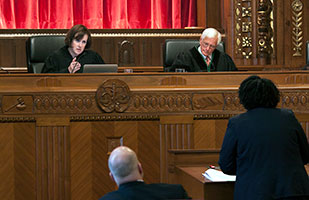Supreme Court to Consider Whether Outbound 911 Calls and Threats to Governor Are Public Record
Among Eight Cases to be Argued on May 27 and 28

A city-county dispute about the repair of a Cuyahoga bridge, jury instructions in state RICO cases, and search-and-seizure limits are on the court’s late May agenda.

A city-county dispute about the repair of a Cuyahoga bridge, jury instructions in state RICO cases, and search-and-seizure limits are on the court’s late May agenda.
The Supreme Court of Ohio will hear arguments in two cases next week that involve public records requests from media outlets. The requests, which were made to the governor’s office and to a sheriff’s department, were denied.
Political web site Plunderbund Media made its request in 2012. After the governor’s office refused to release the governor’s daily schedules because of security concerns, the site’s managing editor asked the Ohio Department of Public Safety for records of threats against the governor. The department responded that investigations of these threats are “security records,” which are exempt from disclosure under the state’s public records law.
Plunderbund argues that some information in the threat investigations qualifies as a “routine offense and incident report.” The media outlet maintains that the Ohio Supreme Court ruled last year that these types of incident reports are public record and must be released.
In the second case, a 911 operator for the Butler County Sheriff’s Office received a call in June 2012 from a woman who said there had been an accident and her husband was not breathing. She asked for help and hung up. When the operator called back, the man’s stepson answered and said that he had stabbed his stepfather.
The Cincinnati Enquirer asked for a copy of the recording of the conversation between the stepson and the 911 operator. The Butler County prosecuting attorney denied the request, stating that the outbound call made by the operator was not a public record. A Butler County judge issued a protective order, requested by the prosecutor, to block the release of the recording. The judge eventually released the recording to the media just before the call was going to be presented to the jury in the stepson’s trial.
The Butler County officials assert that only a call to 911 from a person with an emergency is a 911 call that is public record. They also contend that the conversation between the operator and the stepson evolved into a police interrogation, so the recording did not have to be released because it was part of a criminal investigation.
Along with State v. Plunderbund Media, the court will hear three other cases on Tuesday, May 27. The court will consider State ex rel. The Cincinnati Enquirer v. Hon. Michael J. Sage et al. and three more on Wednesday, May 28. The court’s sessions begin at 9 a.m. each day at the Thomas J. Moyer Ohio Judicial Center in Columbus. The arguments will be streamed live online at sc.ohio.gov and broadcast live on The Ohio Channel.
Along with the brief descriptions below, the Office of Public Information today released summaries of the eight cases.
Cases for Tuesday, May 27
The court will consider these cases, in addition to Plunderbund, during Tuesday’s session:
- In Cuyahoga County Executive v. Independence, a city and a county in northeastern Ohio are at odds over which government body must repair a broken-down bridge. The county argues that the dead-end street accessed by the bridge does not have “general and public utility,” so the city is responsible for fixing the bridge.
- A Hamilton County man in Vanzandt v. State had his criminal case sealed after he was acquitted. Within a couple months, he was charged with retaliating against a witness in the first case. The state asked to unseal the case so it could be used as evidence in the retaliation case. The man contends that Ohio law does not allow records to be unsealed for a subsequent prosecution.
- Jury instructions are at the center of State v. Griffin, which involves a Montgomery County man convicted of participating in a drug ring under the state racketeering-and-corrupt-organizations law. The trial judge defined the element of “enterprise” for the jury based on Ohio statutes, rather than language from federal law. The definition provided in Ohio law adequately conveyed the substance of the federal definition, the state asserts.
Cases for Wednesday, May 28
The court will hear arguments in four cases, including Enquirer, during Wednesday’s session:
- In Castagnola v. State, police searched the home of a suspect while investigating vandalism and retaliation against the Twinsburg city prosecutor. In examining the man’s computer, investigators found child pornography and filed a separate charge. The man argues that no probable cause was established to search his computer, and the warrant was not sufficiently particular in describing the limits of the search.
- A mother who lost custody of her infant son appeals the decision in the case In the Matter of B.C. A child services agency in Clark County took custody of the boy when she was unable to care for him. The mother contends that her original attorney withheld information from her, which caused her to file a late appeal of the decision. Provisions in the appellate rules allowing for delayed appeals should extend to cases involving the termination of parental rights, she asserts.
- The attorney disciplinary board in Cincinnati Bar Association v. Geoffrey Parker Damon recommends the disbarment of a Cincinnati attorney who did not turn over at least $100,000 in fees from clients to his law firm, did not do the legal work for which he was hired, and kept advance payments for cases that had no merit. The attorney argues that he has been punished by a felony conviction for the theft from his law firm and he has paid back most of the agreed-to restitution. He asks the court for the lesser sanction of an indefinite suspension.


